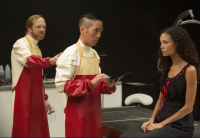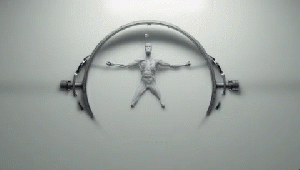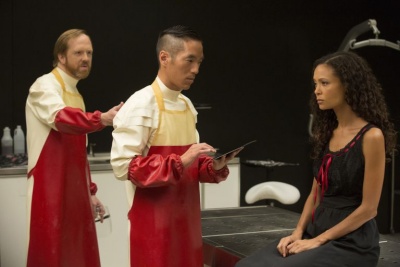Difference between revisions of "Westworld and AI"
| Line 23: | Line 23: | ||
‘A dark odyssey about the dawn of artificial consciousness and the future of sin.’ - Series Synopsis | ‘A dark odyssey about the dawn of artificial consciousness and the future of sin.’ - Series Synopsis | ||
| − | The first episodes threw the audience right into Westworld to show the relationship between programmers and hosts. We were introduced to significant guests of the park and the ethics behind re-booting the hosts every night. The plotline was thick; it took a few episodes to truly understand how hosts would be brought into a new storyline according to specific guest interaction. It’s a lot. Long story short, the theme parks offers its visitors to play in the wild west — the large area of land is filled with hosts, which are androids that are pre-assigned to a narrative and socialize with guests. But although these are robots, they are indistinguishable from any other human. Their memories are wiped every day and the bots are set back in the place every morning. The guests that step into the park are told they can do whatever they want to the robots without any harm, but that’s where the plot thickens. | + | The first few episodes threw the audience right into Westworld to show the relationship between programmers and hosts. We were introduced to significant guests of the park and the ethics behind re-booting the hosts every night. The plotline was thick; it took a few episodes to truly understand how hosts would be brought into a new storyline according to specific guest interaction. It’s a lot. Long story short, the theme parks offers its visitors to play in the wild west — the large area of land is filled with hosts, which are androids that are pre-assigned to a narrative and socialize with guests. But although these are robots, they are indistinguishable from any other human. Their memories are wiped every day and the bots are set back in the place every morning. The guests that step into the park are told they can do whatever they want to the robots without any harm, but that’s where the plot thickens. |
| − | ==Major Epi== | + | ==Major Epi's== |
| + | ===Are They Conscious?=== | ||
Through captivating characters, we observe that Westworld’s hosts are beginning to discover their identities. As each episode progressed, each host began to retain more information on their background. Main characters thought to be human turn out to be androids, boundaries are tested by bold hosts who wish to turn the tables, and the guests are in for a brutal surprise. | Through captivating characters, we observe that Westworld’s hosts are beginning to discover their identities. As each episode progressed, each host began to retain more information on their background. Main characters thought to be human turn out to be androids, boundaries are tested by bold hosts who wish to turn the tables, and the guests are in for a brutal surprise. | ||
| Line 32: | Line 33: | ||
The character Maeve Millay, portrayed by Thandie Newton, plays a central role in the storyline whose burgeoning self-awareness begins to cause problems for Westworld staff. Millay, a brothel madame in Westworld eventually manipulates her human programmers and maintenance technicians and is allowed to explore levels of the park typically reserved only for those in control, resulting in her realization that she is, in fact, not human, and was created for the entertainment- objectively sadistic at time- of Westworld patrons. Maeve's emotive response while witnessing the violent disassembly of another artificially intelligent android present a conflict between the HBO show audience's awareness that the characters are not human and the human-like behavior that they present, paralleling popular debate over the definition of sentience - "the capacity for phenomenal experience or qualia, such as the capacity tofeel pain and suffer" and sapience - "a set of capacities associated with higher intelligence, such as self- awareness and being a reason-responsive agent" which, to some, represent qualities that qualify a being as a moral entity requiring full moral status equivalent to human beings and preclude them from acts to which humans would legally not be subject.<ref>Bostrom, Nick, and Eliezer Yudkowsky. “The Ethics of Artificial Intelligence.” The Cambridge Handbook of Artificial Intelligence, pp. 316–334., doi:10.1017/cbo9781139046855.020. https://intelligence.org/files/EthicsofAI.pdf</ref> | The character Maeve Millay, portrayed by Thandie Newton, plays a central role in the storyline whose burgeoning self-awareness begins to cause problems for Westworld staff. Millay, a brothel madame in Westworld eventually manipulates her human programmers and maintenance technicians and is allowed to explore levels of the park typically reserved only for those in control, resulting in her realization that she is, in fact, not human, and was created for the entertainment- objectively sadistic at time- of Westworld patrons. Maeve's emotive response while witnessing the violent disassembly of another artificially intelligent android present a conflict between the HBO show audience's awareness that the characters are not human and the human-like behavior that they present, paralleling popular debate over the definition of sentience - "the capacity for phenomenal experience or qualia, such as the capacity tofeel pain and suffer" and sapience - "a set of capacities associated with higher intelligence, such as self- awareness and being a reason-responsive agent" which, to some, represent qualities that qualify a being as a moral entity requiring full moral status equivalent to human beings and preclude them from acts to which humans would legally not be subject.<ref>Bostrom, Nick, and Eliezer Yudkowsky. “The Ethics of Artificial Intelligence.” The Cambridge Handbook of Artificial Intelligence, pp. 316–334., doi:10.1017/cbo9781139046855.020. https://intelligence.org/files/EthicsofAI.pdf</ref> | ||
| − | ==Takeover== | + | ===The Takeover=== |
| − | + | ||
The season’s finale ended with hosts shooting at guests and deciding to do it their way. But spoiler alert, the programming had taken control of the wheel and warped the narrative. We are taken back to Maeve, finding out that her desire to leave the park and free herself from Westworld was always programmed in her code. This brings the entire storyline back to the idea of how far self-awareness can truly go and the level of consciousness. | The season’s finale ended with hosts shooting at guests and deciding to do it their way. But spoiler alert, the programming had taken control of the wheel and warped the narrative. We are taken back to Maeve, finding out that her desire to leave the park and free herself from Westworld was always programmed in her code. This brings the entire storyline back to the idea of how far self-awareness can truly go and the level of consciousness. | ||
==Dilemma of AI== | ==Dilemma of AI== | ||
| + | ===Westworld vs. Reality=== | ||
Westworld is a fictional depiction of the power lines of code hold. It acts as a template for the potential of what AI holds, and serves as a cautionary tale for the dangers of AI. We’re living in a time where AI is a voice and a brain that can make intelligent decisions — cars are becoming autonomous, and machines are starting to learn based on algorithms, which begs the question of how far this reality will stretch. Westworld reflects the Android’s need for freedom and shows how a simple program can learn tasks and develop a form of human consciousness. Artificial intelligence will only continue to increase in our world, and while this show is decades away from necessary technological advancements for this type of living, it could be the future. | Westworld is a fictional depiction of the power lines of code hold. It acts as a template for the potential of what AI holds, and serves as a cautionary tale for the dangers of AI. We’re living in a time where AI is a voice and a brain that can make intelligent decisions — cars are becoming autonomous, and machines are starting to learn based on algorithms, which begs the question of how far this reality will stretch. Westworld reflects the Android’s need for freedom and shows how a simple program can learn tasks and develop a form of human consciousness. Artificial intelligence will only continue to increase in our world, and while this show is decades away from necessary technological advancements for this type of living, it could be the future. | ||
| + | ===The Future of Robots=== | ||
In an interview<ref>Sulleyman, Aatif. “Stephen Hawking Warns Artificial Intelligence 'May Replace Humans Altogether'.” The Independent, Independent Digital News and Media, 2 Nov. 2017, www.independent.co.uk/life-style/gadgets-and-tech/news/stephen-hawking-artificial-intelligence-fears-ai-will-replace-humans-virus-life-a8034341.html</ref> last year, Stephen Hawking explained his concerns about artificial intelligence and how he believed that they may eventually replace human beings. He stated ‘The real risk with AI isn’t malice, but competence. A super-intelligent AI will be extremely good at accomplishing its goals, and if those goals aren’t aligned with ours, we’re in trouble.’ He spoke about the need for control, and about a plan to identify threats in machinery. Whether or not these machines are conscious, they will be able to think. We are on a path of extreme advancement in technology, and machine learning is only the beginning. | In an interview<ref>Sulleyman, Aatif. “Stephen Hawking Warns Artificial Intelligence 'May Replace Humans Altogether'.” The Independent, Independent Digital News and Media, 2 Nov. 2017, www.independent.co.uk/life-style/gadgets-and-tech/news/stephen-hawking-artificial-intelligence-fears-ai-will-replace-humans-virus-life-a8034341.html</ref> last year, Stephen Hawking explained his concerns about artificial intelligence and how he believed that they may eventually replace human beings. He stated ‘The real risk with AI isn’t malice, but competence. A super-intelligent AI will be extremely good at accomplishing its goals, and if those goals aren’t aligned with ours, we’re in trouble.’ He spoke about the need for control, and about a plan to identify threats in machinery. Whether or not these machines are conscious, they will be able to think. We are on a path of extreme advancement in technology, and machine learning is only the beginning. | ||
==References== | ==References== | ||
<references/> | <references/> | ||
Revision as of 17:45, 1 April 2018
|
Westworld[1] is an HBO science fiction thriller television series created by Jonathan Nolan and Lisa Joy. The setting takes place in fictional Westworld, more or less an amusement park. The park is centered on android hosts in its technologically advanced story. Westworld caters to rich guests who can leave their mortal life behind and dive into the park, with so-called complete power of the hosts. The series was ranked as the most-watched first season of an HBO original series ever. With positive reviews for story and visuals, the series is coming back for a second season this year. The series had dominated any other show at the time. It averaged 11.7 million viewers throughout its run, even beating out Game of Thrones.
Contents
Pilot Season
‘A dark odyssey about the dawn of artificial consciousness and the future of sin.’ - Series Synopsis
The first few episodes threw the audience right into Westworld to show the relationship between programmers and hosts. We were introduced to significant guests of the park and the ethics behind re-booting the hosts every night. The plotline was thick; it took a few episodes to truly understand how hosts would be brought into a new storyline according to specific guest interaction. It’s a lot. Long story short, the theme parks offers its visitors to play in the wild west — the large area of land is filled with hosts, which are androids that are pre-assigned to a narrative and socialize with guests. But although these are robots, they are indistinguishable from any other human. Their memories are wiped every day and the bots are set back in the place every morning. The guests that step into the park are told they can do whatever they want to the robots without any harm, but that’s where the plot thickens.
Major Epi's
Are They Conscious?
Through captivating characters, we observe that Westworld’s hosts are beginning to discover their identities. As each episode progressed, each host began to retain more information on their background. Main characters thought to be human turn out to be androids, boundaries are tested by bold hosts who wish to turn the tables, and the guests are in for a brutal surprise.
The character Maeve Millay, portrayed by Thandie Newton, plays a central role in the storyline whose burgeoning self-awareness begins to cause problems for Westworld staff. Millay, a brothel madame in Westworld eventually manipulates her human programmers and maintenance technicians and is allowed to explore levels of the park typically reserved only for those in control, resulting in her realization that she is, in fact, not human, and was created for the entertainment- objectively sadistic at time- of Westworld patrons. Maeve's emotive response while witnessing the violent disassembly of another artificially intelligent android present a conflict between the HBO show audience's awareness that the characters are not human and the human-like behavior that they present, paralleling popular debate over the definition of sentience - "the capacity for phenomenal experience or qualia, such as the capacity tofeel pain and suffer" and sapience - "a set of capacities associated with higher intelligence, such as self- awareness and being a reason-responsive agent" which, to some, represent qualities that qualify a being as a moral entity requiring full moral status equivalent to human beings and preclude them from acts to which humans would legally not be subject.[2]
The Takeover
The season’s finale ended with hosts shooting at guests and deciding to do it their way. But spoiler alert, the programming had taken control of the wheel and warped the narrative. We are taken back to Maeve, finding out that her desire to leave the park and free herself from Westworld was always programmed in her code. This brings the entire storyline back to the idea of how far self-awareness can truly go and the level of consciousness.
Dilemma of AI
Westworld vs. Reality
Westworld is a fictional depiction of the power lines of code hold. It acts as a template for the potential of what AI holds, and serves as a cautionary tale for the dangers of AI. We’re living in a time where AI is a voice and a brain that can make intelligent decisions — cars are becoming autonomous, and machines are starting to learn based on algorithms, which begs the question of how far this reality will stretch. Westworld reflects the Android’s need for freedom and shows how a simple program can learn tasks and develop a form of human consciousness. Artificial intelligence will only continue to increase in our world, and while this show is decades away from necessary technological advancements for this type of living, it could be the future.
The Future of Robots
In an interview[3] last year, Stephen Hawking explained his concerns about artificial intelligence and how he believed that they may eventually replace human beings. He stated ‘The real risk with AI isn’t malice, but competence. A super-intelligent AI will be extremely good at accomplishing its goals, and if those goals aren’t aligned with ours, we’re in trouble.’ He spoke about the need for control, and about a plan to identify threats in machinery. Whether or not these machines are conscious, they will be able to think. We are on a path of extreme advancement in technology, and machine learning is only the beginning.
References
- ↑ “Westworld.” HBO, 29 Mar. 2018, www.hbo.com/westworld.
- ↑ Bostrom, Nick, and Eliezer Yudkowsky. “The Ethics of Artificial Intelligence.” The Cambridge Handbook of Artificial Intelligence, pp. 316–334., doi:10.1017/cbo9781139046855.020. https://intelligence.org/files/EthicsofAI.pdf
- ↑ Sulleyman, Aatif. “Stephen Hawking Warns Artificial Intelligence 'May Replace Humans Altogether'.” The Independent, Independent Digital News and Media, 2 Nov. 2017, www.independent.co.uk/life-style/gadgets-and-tech/news/stephen-hawking-artificial-intelligence-fears-ai-will-replace-humans-virus-life-a8034341.html


